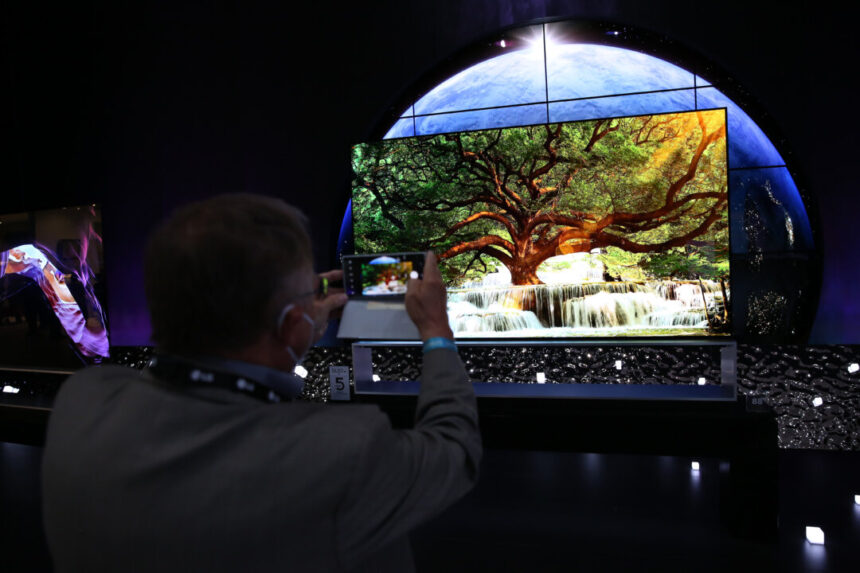News Analysis
In a span of just one year, China has surpassed South Korea as the leading provider of Organic Light-Emitting Diode (OLED) displays.
OLED displays offer superior color accuracy, faster response times, and greater energy efficiency compared to traditional Liquid Crystal Displays (LCDs). These screens are found in many devices we use daily, such as high-end TVs, monitors, and smartphones. Apple has been using OLED screens in its iPhones since 2017, starting with the iPhone X. However, OLED production is known to be challenging due to its complex manufacturing process, expensive equipment, and high defect rates.
Data released by London-based market research firm Omdia last month revealed that China’s global unit sales share rose to 49.7 percent in the first quarter of this year, surpassing South Korea’s 49 percent. In the same quarter last year, South Korea was leading with a 62 percent market share compared to China’s 37 percent.
Despite Chinese companies catching up in unit sales, South Korean companies still hold double the revenue share of China. This indicates that Chinese units are being sold at half the price of South Korean units.
Even Japan, known for its technological prowess, only holds about two percent of the global production capacity, according to Statista. South Korea has long been the dominant producer, so the recent news of China overtaking it as the top OLED producer has surprised many in the industry, marking a significant shift in the global tech landscape.
In an interview with The Epoch Times, Wang Chih-Sheng, director of Asia-Pacific Elite Interchange Association, a Taiwanese think tank, mentioned that China employs “talent acquisition, technology theft, and mergers and acquisitions” as the three major strategies to acquire foreign technology.
He noted that South Korea, once a dominant force in high-tech manufacturing, is now being outpaced by Chinese companies. This trend poses risks to Western nations that rely on these technologies for consumer goods and defense applications, undermining South Korea’s global market standing.
Wang highlighted, “When Chinese companies dominate key industries, they not only control pricing but also influence global technology standards. For instance, if Chinese companies lead the 5G market, they can set the technical standards for other countries to follow, impacting national security and international politics.”
Broader Pattern of IP Theft
China’s rise to OLED leadership has been clouded by allegations of predatory practices. Reports suggest that its rapid advancements in OLED and LCD technologies stem from systematic technology theft, often targeting South Korea’s cutting-edge innovations.
BOE Technology Group, founded in Beijing in 1993, initially focused on selling vacuum devices and electronic components but swiftly became a global leader in display technology, particularly OLEDs, with significant support from the Chinese Communist Party (CCP). As China’s premier display manufacturer, BOE exemplifies the CCP’s strategy to dominate critical global technologies, driving China’s ambitions in both commercial and military realms.
Wang explained, “China benefits from its state-driven economic model, where the government provides substantial financial backing to key industries. This allows Chinese companies like BOE to offer products at lower prices, undercutting international competitors.”
In 2002, BOE acquired the South Korean company Hydis, a subsidiary of Hynix Semiconductor known for its advanced LCD technologies. However, in 2006, BOE suddenly declared Hydis bankrupt and shifted its operations back to China.
The South Korean display industry suspected BOE of technology theft, leading to an investigation by the Seoul Central District Prosecutors in 2008. The investigation revealed that the two companies had signed a licensing agreement and merged their computer networks in 2004. Prosecutors indicted the former chairman and an executive of Hydis for breach of trust, alleging that they provided BOE with more than agreed upon, resulting in the leakage of industrial secrets and technical data to China, causing significant harm to Hydis.
The alleged theft of South Korean technologies by Chinese entities extends beyond BOE. Several incidents involving former employees of top South Korean firms like LG Display and Samsung have indicated a broader pattern of potential systematic intellectual property theft.
In August, former LG Display employees were arrested by South Korean prosecutors for allegedly violating laws related to industrial technology protection and trade secret protection. These individuals are accused of leaking advanced OLED technology to Chinese companies.
One of the arrested individuals, a former LG Display employee with two decades of experience, is accused of orchestrating the theft after joining an unnamed Chinese display company in 2021. He allegedly collaborated with current LG Display employees to steal large-scale OLED production technology, significantly boosting China’s capabilities in this critical industry, as reported by South Korean media.
These cases are not isolated incidents. In July, a former Samsung researcher received a six-year prison sentence for leaking Samsung’s OLED manufacturing technology to China.
The stolen technologies, including Excimer Laser Annealing (ELA) and OCR Inkjet Equipment, are estimated to be worth around $250 million and play a crucial role in upholding the quality and efficiency of OLED production.
In July 2023, the South Korean Supreme Court sentenced the former representative of TOPTEC, a South Korean tech firm, to three years in prison for selling Samsung’s OLED folding technology to four Chinese companies, including BOE. This technology, developed over six years with an investment exceeding $120 million and involving the efforts of 38 engineers, was unlawfully transferred.
Recognizing the significance of such innovations, the South Korean government has identified over 100 technologies in high-tech sectors like display, semiconductor, battery, and shipbuilding as “National Core Technologies.” These advancements are safeguarded under the Industrial Technology Protection Act to prevent unauthorized transfer or leakage.
Earlier this year, South Korean authorities charged several individuals, including current and former employees of Samsung SDI and SK On, two South Korean battery companies, with violating the Industrial Technology Protection Act. These employees were accused of collaborating with Svolt Energy Technology, a Chinese battery company, to steal core technologies from South Korean battery giants.
Data from the Korean National Police Agency revealed that a majority of South Korea’s leaked core technologies end up in China, with 83 percent of such cases in the first half of the year involving China as the destination. The proportion of South Korean technology leaked overseas has been increasing annually, with 67 percent of it going to China.
In recent years, South Korea’s leadership in industries like batteries and shipbuilding has been overshadowed by China, with Chinese companies capturing a considerable share of the global electric vehicle battery market. A report from the Korea Institute for Industrial Economics and Trade indicated that China surpassed South Korea in the shipbuilding industry value chain in 2023.
The semiconductor sector is also a prime target for technology theft. In late 2023, South Korean prosecutors detained a former Samsung Electronics department head for leaking critical DRAM technology to ChangXin Memory Technologies (CXMT), China’s largest DRAM manufacturer. Strengthening regulations and protections around core technologies is essential to prevent technology theft and safeguard national security and economic stability.
Xin Ning contributed to this report. Please rewrite this sentence.
Source link





